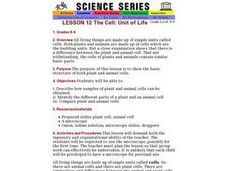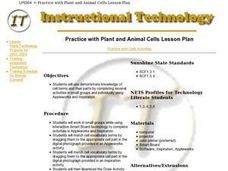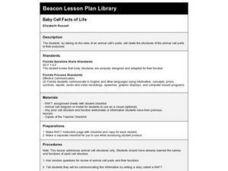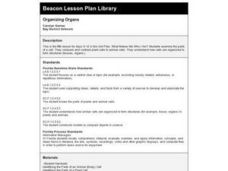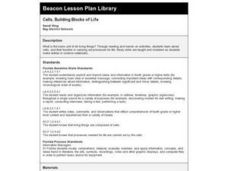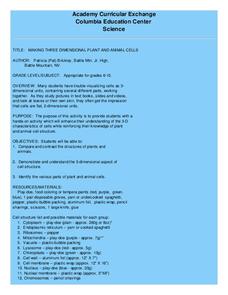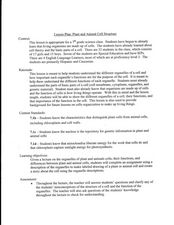Curated OER
The Cell: Unit of Life
Students identify the parts of plant and animal cells, how samples can be obtained and what the differences are.
Curated OER
Practice with Plant and Animal Cells
Students work in small groups to match cell vocabulary terms to the appropriate cell part in a photograph. They use a draw program to sketch a plant and animal cell.
Curated OER
Edible Cells
Eighth graders construct edible models of a plant cell and an animal cell and state the functions of the organelles. They are to write a short sentence describing the function of each organelle.
Curated OER
Cell Cycle Movie
Fourth graders draw on previous knowledge and create hand-held flip books that show a cell going through the motions of the cell cycle. They create a flip book, which illustrates the cell cycle.
Curated OER
Cell Factory
Middle schoolers examine the basic structures and functions of cells. They design and construct a factory cell model where each factory part corresponds to a cell part.
Curated OER
Baby Cell Facts of Life
Students examine the roles of an animal cell's parts, how each part relates to one another and then demonstrate their knowledge by writing a story about the animal cell structure.
Curated OER
Organizing Organs
Fifth graders research plant and animals cells and create a Venn Diagram to show the similarities and differences.
Curated OER
Cells, Building Blocks of Life
Fourth graders, in groups, explore cells, the basic unit of all living things.
Curated OER
Cell Types
Fourth graders create cartoon characters which compare and contrast two types of cells: nerve and muscle. Cartoon characters show how these two cells are similar, how they are different, and the relationship between the two cell types.
Curated OER
Cells in the Making
Students examine and research the parts of a cell, their functions, and life processes. They simulate how cells receive nutrients using coffee filters, water, and coffee, and construct cells using pudding, cookie dough, and candy.
Curated OER
I Need Air
Students examine and research the organs of the respiratory system. They participate in a vocabulary card matching game, create a graphic organizer, and participate in an experiment titled, Floating on Air.
Curated OER
2D Concept Visualization: Cell Organelles Presentation
Students create simple 2D concept driven visualizations of cells and cell organelles and organize them into an effective presentation.
Curated OER
How Does Cell Size And Shape Affect Transport of Materials
Tenth graders explore concepts of surface area, volume, and ratios, create spreadsheets to aid organization of data collected and provide graphing capabilities, and use NIH Imaging to enable calculations of microscopic organisms.
Curated OER
A Cell Is Like A City
Students create analogies that help them remember the cell parts as well as their respective functions.
Curated OER
WHAT IS A CELL?
Students explore the function and structures of cells, including plant and animal cells. They explore cell parts including cell wall, ribosomes, chromosomes, nucleoid, plasmids, flagella, pilli, and plasma membrane, cel
Curated OER
Making Three Dimensional Plant and Animal Cells
Students use a hands-on activity which enhance their understanding of the 3-D characteristics of cells while reinforcing their knowledge of plant and animal cell structure.
Curated OER
Plant Cell Coloring
Students study a plant cell and its parts. In this cell organelle lesson students are to label parts of a plant cell and color them.
Curated OER
Welcome to the Kingdom
Students study animal classification. In this classification lesson students examine animal characteristics and answer questions on a handout.
Curated OER
It's Alive! Or is it?
Students differentiate the characteristics of living and nonliving things. In this life science lesson, students compare and contrast robots and living things. Given an object, they decide whether it's is living or not and defend their...
Curated OER
Who Wants to be a Cellular Biologist?
Eighth graders review concepts in cellular biology. In this biology lesson, 8th graders play an interactive game based on the idea of winning money. They discuss misconceptions about the topic.
Curated OER
Cell Works
Young scholars identify the different parts of the cells and their functions. In this biology lesson plan, students create an analogy of a cell and its organelles. They make a poster and present it to class.
Curated OER
Plant and Animal Cell Structure
Seventh graders identify the different parts and functions of the cell. In this biology lesson, 7th graders make a labelled diagram of either a plant or animal cell. They write a story about it.
Curated OER
How Cells Reproduce
Students construct a mitosis flip book. In this biology lesson, students describe the different stages of mitosis. They discuss the importance of cell reproduction.
Curated OER
Mitosis
Seventh graders describe the stages of mitosis. In this biology lesson, 7th graders explain the importance of cell division. They complete an activity packet at the end of the lesson.


